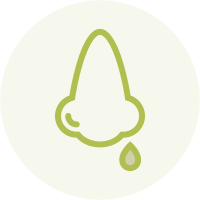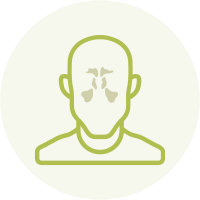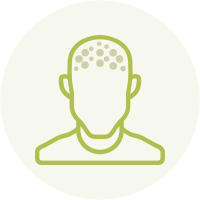The severe and prolonged cold
The bad cold is a complication of the common cold, this is a mild and self-limited viral infectious disease that normally heals in about 7 days. There is no treatment to cure the cold, only to relieve the symptoms.
What are the symptoms of a severe cold?
The long-term severe cold and sinusitis share symptoms, and in fact, a cold that lasts longer than 10 days is called acute sinusitis. If the cold symptoms persist for more than 3 months, then it is classified as chronic sinusitis.

Nasal congestion
Nasal congestion occurs due to blockage of the nasal passages consequently causing what is known as a “stuffy nose”.

Runny nose
A runny nose occurs when the nasal cavity is filled with mucus.

Headache
When the sinuses are blocked, nasal pressure increases significantly and causes facial pain.

Loss of smell
Inflammation or blockage of the sinuses can affect the sense of smell.
But what about sinusitis?
Prolonged, severe cold and sinusitis share symptoms. In fact, a cold that lasts more than 10 days is called acute sinusitis. If the cold symptoms persist for more than 3 months, then it is classified as chronic sinusitis.

Causes of severe cold
Typically a cold lasts 7-10 days with complete resolution of symptoms. In some cases, cold symptoms last longer than 10 days and then you are suffering from what doctors call acute sinusitis.
What can make a cold last more than 10 days?
There are several factors that alone or in conjunction with others can prolong a cold. A weakened immune system (what people call low defenses) makes it difficult to cure infections and therefore all factors that affect the immune system prolong the cold.
How to PREVENT a severe cold
By knowing the factors that can lengthen a cold, the logical recommendation is to avoid them…
Get enough rest and sleep, at least eight hours.
Take life easy! Although we know that sometimes it is difficult …
Hydrate yourself well.
Consult with your doctor if a cold lasts beyond 10 days.
Avoid tobacco and alcohol.
Tips to STOP a prolonged cold
Obviously, the best way to prevent a long cold before it starts is… to prevent the cold.
Here are some tips to stop a cold before it starts:
Help your immune system
Preventing a cold starts with your “strong” immune system.
Get plenty of rest and sleep. Drink fluids and eat a balanced diet. Avoid a sedentary lifestyle. Take it easy, avoid stress.
Avoid contact
Prevention of the common cold is sometimes as simple as avoiding people who have a cold, especially during the first 2-3 days when symptoms such as a sore throat appear.
Wash your hands frequently
A great way to help prevent a cold is to wash your hands frequently for 20 seconds to prevent the spread of the virus.
Don’t touch your eyes or nose
Keep your fingers away from your eyes and nose to avoid spreading germs.
Frequently asked questions about long-term severe cold
Is the common cold caused by viruses?
Colds are caused by different types of viruses, with rhinoviruses causing the majority of colds. Other possible types of viruses that can cause colds include adenovirus, coronavirus, enterovirus, parainfluenza virus, and respiratory syncytial virus (RSV).
Rhinoviruses can also cause other conditions like sinus infections, pneumonia, ear infections, and sore throats, and can trigger asthma attacks.
What are the signs and symptoms of the common cold?
The most common symptoms of a cold are a stuffy nose, runny nose, watery eyes, body aches, sore throat, and sometimes a mild fever.
Later, coughing and sneezing may appear. Symptoms develop 1-3 days after exposure to the virus. The duration of cold symptoms varies, but is usually 7 to 10 days.
What is the cure for the common cold?
There are remedies that can relieve cold symptoms, but there is no cure for the common cold. Home remedies to relieve symptoms include rest, drink plenty of fluids, and take pain relievers and fever medications.
Antibiotics are not effective against colds as they do not work against viruses.
What is one of the best possible ways to prevent colds?
Good handwashing practices are a great way to prevent colds.
It is important to wash your hands well with soap and water. Use an alcohol-based sanitizer if soap and water are not available. Do not touch your eyes, nose, or mouth with unwashed hands, as this can cause cold viruses to enter your body. Avoiding close contact with people with colds can also help prevent infection.
When is the cold season?
Cold season occurs every year during the fall and winter, and generally peaks in January and February.
Is a cold the same as the flu?
No. The flu usually appears suddenly, with a high fever (38 ºC). It is accompanied by very intense muscle pain, especially located in the lumbar region and lower extremities. The flu is potentially more serious than the cold, as it can be complicated by respiratory superinfections, and in certain risk groups (the elderly, children, asthmatics) it can have a serious prognosis.
Can I get a flu shot when I have a cold?
Yes, you can get vaccinated when you have a cold, as long as you don’t feel very sick and don’t have a fever.
Nasodren® is a 100% natural, effective and safe spray for the relief of all the symptoms of long and bad cold. Quick relief from the first application.


